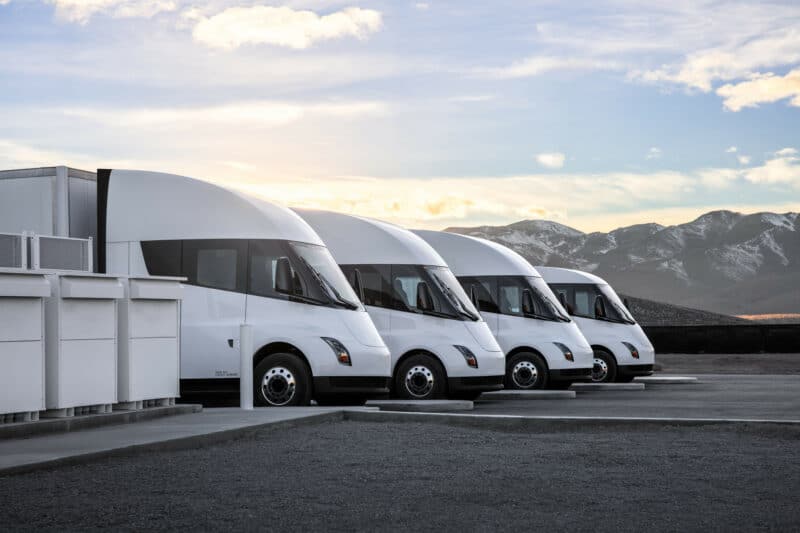The National Fund for Environmental Protection and Water Management (NFOŚiGW) has announced a project to provide subsidies of up to PLN 750k for the purchase of zero-emission heavy-duty vehicles. A total of PLN 1 billion will be allocated for these subsidies. “Supporting the eHDV market is crucial for maintaining the competitiveness of the Polish heavy-duty road transport industry. Alongside subsidies, regulatory changes should be implemented,” says the Polish Alternative Fuels Association(PSPA).
NFOŚiGW presented for consultation a draft priority program “Support for the purchase or leasing of zero-emission N2 and N3 category vehicles”. According to the Fund’s proposal, the program budget is expected to be PLN 1 billion. This is more than the amount earmarked for supporting the purchase of electric passenger and delivery vehicles under the “My Electric” program (PLN 800 million). Applications will be accepted on a continuous basis in the years 2024-2028 or until the allocation is exhausted.
The subsidy will be granted in the form of a grant (purchase) or a grant for the initial fee (leasing). The beneficiaries of the program will be entrepreneurs. The subsidies will only cover new, zero-emission (i.e., fully electric or hydrogen) N2 vehicles (with a gross permissible weight of over 3.5 t to 12 t) and N3 vehicles (with a GPW of over 12 t). The minimum annual mileage of a vehicle covered by the subsidy should be at least 50,000 km.
The amount of subsidies will depend on the size of the company applying for support and the category of the subsidized vehicle. In the case of a purchase, it will be up to 30% of qualified costs (large enterprises), up to 50% (medium-sized enterprises), and up to 60% (small enterprises). Concurrently, the grant amount when purchasing will not exceed PLN 400k (N2 category) or PLN 750k (N3 category). If the beneficiary opts for leasing, the grant will not exceed the initial payment.
“Based on the draft, qualified costs should in every case be reduced by the cost of a benchmark investment, i.e., the purchase of a comparable combustion engine vehicle. This means that the subsidy in practice is granted from the difference between a conventional vehicle and a zero-emission one. This is the model used in most countries that have introduced eHDV subsidies. However, considering the size of the company when determining the amount of a subsidy for a zero-emission heavy-duty vehicle is a mechanism that the Netherlands and Spain, among others, have implemented,” says Piotr Ziółkowski of the PSPA.
As PSPA points out, the transport industry is one of the pillars of the Polish economy. In Poland, the TSL sector accounts for 6% of GDP and comprises 125k companies, employing approximately 750k people. Given the radical changes occurring in this area in the European Union, the development of electromobility is a necessary factor for protecting the competitiveness and innovation of the Polish market. The strategic goals of the EU, successive proposals for tightening emission standards for heavy vehicles (expressed in the draft amendment to Regulation 2019/1242 or the announced Euro 7 standard), and the drive of many companies for supply chain decarbonization, including the transport stage, dictate this.
“If Polish entrepreneurs are to remain competitive in the European market, they must electrify their fleet of heavy vehicles. Due to price differences in purchasing compared to combustion engine vehicles, this will not be feasible without introducing subsidies. Such instruments have already been implemented on 4 out of 5 of the largest heavy transport markets in Europe (Germany, France, Spain, and the Netherlands). The only exception is Poland. Therefore, today’s announced program is a step in the right direction. PSPA has already begun consulting this project with leading representatives of the new mobility industry. The program’s assumptions will also be the subject of discussion at the next PSPA Logistics and Transport Committee meeting,” says Jan Wiśniewski, Director of the PSPA Center for Research and Analysis.
In its analyses and reports, PSPA has repeatedly pointed out that mass electrification of Poland’s heavy-duty fleet (currently the largest in Europe, with about 1.2 million units) needs more than just vehicle purchase subsidies. It requires the introduction of other supportive instruments. Subsidies should also cover dedicated high-power eHDV charging infrastructure. Concurrently, it is necessary to amend the law to, among other things, streamline the cumbersome process of connecting ultra-fast chargers to the power network. This is particularly significant in the context of the EU AFIR regulation’s ambitious goals for the development of charging infrastructure for eHDVs along the TEN-T network. Other legislative changes proposed by the industry include road toll exemptions for zero-emission trucks, allowing such vehicles to enter limited traffic zones, and increasing the permissible gross weight of eHDVs. Tax breaks for entities investing in environmentally-friendly transport would also accelerate the electrification of truck fleets in Poland.
“The full set of proposed specific regulatory and systemic changes that would greatly facilitate the development of electromobility in heavy transport will be presented by PSPA in the ‘White Paper on New Mobility’. This is a study containing over 120 legislative change proposals. Over 250 entities from the entire value chain of the e-mobility sector worked on it, including manufacturers of zero-emission heavy-duty vehicles, leading charging infrastructure operators, and leading carriers. Given the importance of the heavy-duty road transport sector for the Polish economy and the number of people employed in this sector, we expect our proposals to meet with a possibly quick, positive response from public administration,” says Aleksander Rajch, a board member of PSPA.
